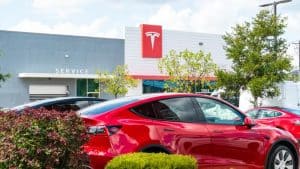
The mass adoption of electric vehicles (EVs) might be further dampened by the rise in prices for the metals — such as lithium, cobalt and nickel — used in EV batteries.
“Steep rises in battery raw materials prices since the start of 2021 are causing speculation over either demand destruction or delays, and have led to the belief that automotive companies could shift preferences for their electric vehicles,” according to a Standard & Poor’s blog post.
S&P adds that the lowest-cost type of battery pack has always been lithium-iron-phosphate (LFP), which Tesla has been using for its China-made entry-level models since 2021. Other carmakers such as Volkswagen and Rivian also announced they will use LFP in less expensive models, S&P added. Lithium prices have surged over 700% since the start of 2021, which has led to a big jump in battery pack prices.
Addressing the auto industry’s rapid shift to EVs, Toyota chief scientist Gill Pratt said last week that, “the world has thought about this in too simple of a way,” according to Seeking Alpha, warning, “there’s going to be this crunch [of] not enough materials” — and that conditions likely will remain “hard” in the near- and mid-term.
Cobalt and Nickel Prices Continue to Soar
Bloomberg reports that prices for other necessary manufacturing materials, including cobalt and nickel, have also soared in the past year, “eating into EV makers’ margins at a crucial point in the development of the burgeoning industry.”
“With demand climbing, they now face a dilemma: swallow the incremental costs, or try passing them on to consumers,” Bloomberg reports.
Indeed, S&P reports that Cobalt metal price is up 70% on year.
“The surging concerns about lithium, and other battery metals, becoming the limiting factor to drive EV adoption has led automakers to increasingly get involved in the upstream side of the industry,” S&P said.
General Motors announced in July 2021 that it had partnered with Controlled Thermal Resources’ Hell’s Kitchen lithium project in California to secure local and low-cost lithium.
“Batteries are and will remain one of the largest cost drivers of EVs. Lithium is a key battery material used in the cathodes and electrolytes of GM EVs like the Chevrolet Bolt EV and Bolt EUV. Lithium will become even more important in battery use as GM explores lithium metal batteries with a protected anode,” GM said in a press release at the time, adding that most lithium used in lithium-ion batteries is currently mined and processed outside of the U.S.
Stellantis also recently — as of November 2021 — partnered with Vulcan Resources, whose Zero Carbon Lithium Project (Upper Rhine Valley, Germany) uses geothermal energy to produce battery-quality lithium hydroxide from brine “without the use of fossil fuels and minimal water usage, reducing the generation of carbon in the battery metals supply chain,” according to a press release.
Volkswagen and Renault also partnered with Vulcan, according to S&P.
